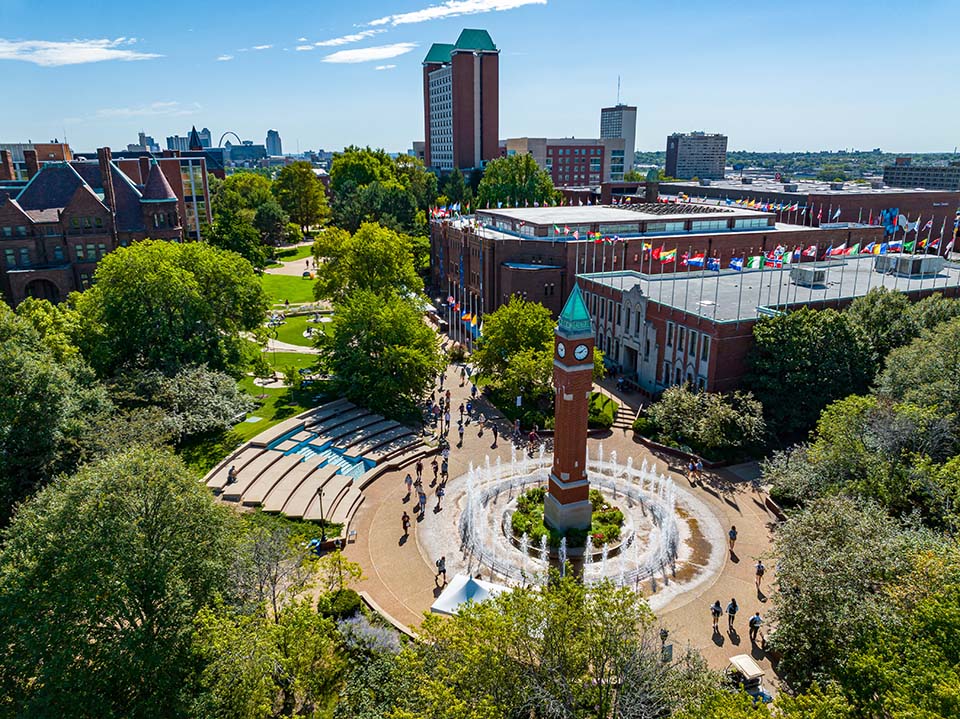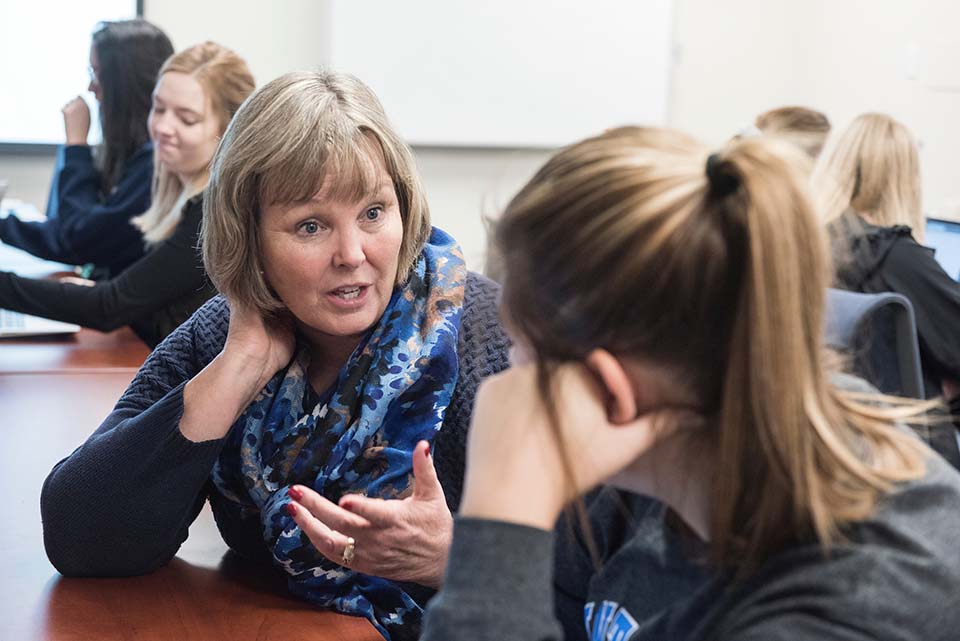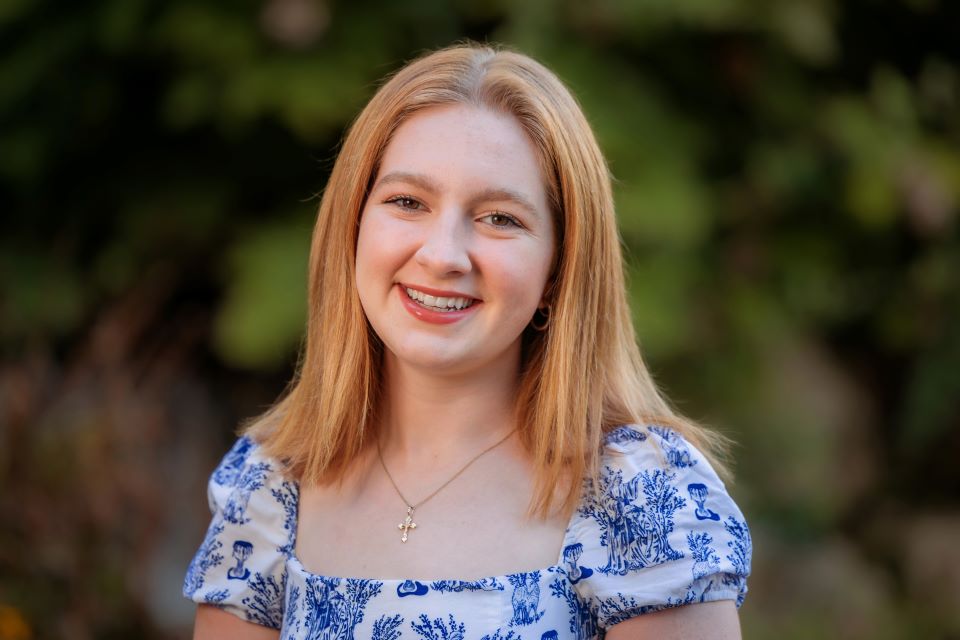SLU Partners with Washington University on Midwest Center for AIDS Research
The Center brings together researchers, practitioners and trainees to build relationships and end the regional HIV epidemic.

The Midwest Center for AIDS Research, established in partnership with Saint Louis University and Washington University in St. Louis, aims to support HIV research at all levels, from laboratory experiments to community program pilots.
In a bid to jump-start the campaign against HIV in the region, Saint Louis University, in partnership with Washington University School of Medicine, will establish the Midwest Developmental Center for AIDS Research with funding from the National Institutes of Health (NIH). The center, slated to open in September, will aim to create a platform for researchers and public health workers to collaborate and coordinate their efforts to fight the HIV epidemic together.
“This center is built on collaboration between our regional universities,” said Enbal Shacham, Ph.D., a professor of behavioral science and health equity in the College for Public Health and Social Justice at Saint Louis University, and the associate director of the center. “It will focus our efforts to grow research on HIV prevention, care and treatment to our St. Louis region together. I am thrilled to lead the Saint Louis University partnership particularly because of the opportunities this creates for our communities in improving HIV-related health equity and outcomes.”
Since the peak of the AIDS epidemic, the U.S. has achieved significant advancements in preventing and treating HIV, though progress has been uneven across regions and slower than necessary. In Missouri, where the number of new HIV diagnoses and deaths has not improved since 2017, there is a need to recapture momentum in addressing the disease.
“There’s a public perception that we’re on the other side of the HIV epidemic,” said Elvin Geng, M.D., a Washington University professor of medicine who will direct the new center. “St. Louis continues to have a significant HIV epidemic. One problem we face here in St. Louis is that the scientific and public health communities are strong but siloed. The goal of this center is to break down those siloes so we can all work together more effectively to end the HIV epidemic in the region.”
Every year, approximately 500 people are newly diagnosed with HIV in Missouri, and nearly 200 die of diseases related to HIV infection. Thirteen of the U.S. counties identified by the Centers for Disease Control and Prevention to be at highest risk of an HIV outbreak are in Missouri. Most people in the state get diagnosed late in the disease process, after their immune cells have begun to die off. This pattern of late diagnosis suggests that the official numbers probably underestimate the true infection rate in the state. Worse, it means that many people who could benefit from HIV treatment are not receiving it, which threatens their health and hinders efforts to limit the spread of the virus.
The NIH established the Centers for AIDS Research (CFAR) program in 1988 to promote high-quality research to combat the AIDS epidemic, which was then raging out of control. Over the years, 19 CFARs have been established throughout the country. The new center in St. Louis is a developmental CFAR, meaning it is in a five-year initiation phase.
The mission of the CFAR program is to provide a framework to bring the people who conduct the research into conversation with the people who are fighting the epidemic on the ground. To that end, the center has pulled together a stakeholder advisory committee including representatives from the city and state health departments, as well as from Fast-Track Cities St. Louis, the local branch of an international campaign to end the HIV/AIDS epidemic by 2030, and the Metro St. Louis HIV Health Services Planning Council. The center will institute a variety of programs to enhance collaboration including:
- Show Me the Response, an annual regional symposium that will give scientists and public health practitioners the opportunity to meet in person and share data and insights.
- Partner Pilot Awards, which will go to research teams co-led by investigators from traditional research universities and non-research organizations.
- Internship opportunities at the city’s Department of Health for students from Harris-Stowe State University, a historically Black university.
“The Midwest Center for AIDS Research will help diversify the approach to, and the leaders engaged in, efforts to mitigate the AIDS epidemic,” said Harvey R. Fields Jr., Ph.D., dean of the College of STEM at Harris-Stowe. “The inclusion of Harris-Stowe State University leverages institutional strengths, enhances institutional capability and provides Harris-Stowe’s developing health-care scholars with opportunity to make meaningful contributions to their own communities even as undergraduates.”
The center will be based in St. Louis and initially will focus on building relationships within the city and county. Over the longer term, the center will expand into outlying counties to address the state’s significant rural epidemic as well. Dima Dandachi, M.D., the medical director for the Columbia/Boone County Public Health and Human Services Department in central Missouri and the medical director of the HIV/AIDS treatment and prevention program at University of Missouri Health Care, sits on the center’s scientific working group to help guide research priorities.
The center aims to support HIV research at all levels, from laboratory experiments to community program pilots. To ensure that research funded by the center will answer the questions most critical to public health efforts and to people living with HIV, projects will be selected by a committee composed of people from academic and nonacademic organizations.
Latest Newslink
- Kathryn Mitchell Pierce, Ph.D.: 1955-2025Kathryn Mitchell Pierce, Ph.D., associate professor of educational studies, died Wednesday, Dec. 10, 2025. She was 70 years old. Pierce joined Saint Louis University in 2015 as an assistant professor in the School of Education. Initially a literacy specialist in the undergraduate program, she eventually taught and mentored across all levels at the School of Education. She became an associate professor in 2022.
- Saint Louis University Student Speaks About Leadership and Disability at Ignatian Family Teach-In for JusticeSaint Louis University senior Grace LoPiccolo shared her personal leadership journey at the 2025 Ignatian Family Teach-In for Justice. The event, held annually in Washington, D.C., is the nation’s largest Catholic social justice advocacy day.
- SLU Research Shows Surge in Alcohol-Related Liver Disease Driving ‘Deaths of Despair’Researchers at Saint Louis University School of Medicine say deaths from alcohol-related liver disease have surged in recent years, and the increase is hitting people without a college degree the hardest. While nearly every demographic group is seeing higher death rates—including those with college degrees—the gap between economically disadvantaged groups and more affluent ones is growing, according to new research.
- Saint Louis University Joins Multi-Disciplinary Research Team to Enhance Stress Resilience in SorghumSaint Louis University is part of a multi-disciplinary team, led by the Donald Danforth Plant Science Center, to deepen the understanding of sorghum, a versatile bioenergy crop, and its response to environmental challenges.The U.S. Department of Energy (DOE) Biological and Environmental Research (BER) program supports the three-year $2.5 million project for Genomics-Enabled Understanding and Advancing Knowledge on Plant Gene Function. Saint Louis University will receive $437,039 for its portion of the study.
- SLU Graduates Celebrated at Midyear CommencementSaint Louis University celebrated its Midyear Commencement on Saturday, Dec. 13, inside Chaifetz Arena. More than 1,900 guests watched as 600-plus SLU students walked across the stage and left as graduates.
- Why Do Raccoons Cross the Road? SLU, St. Louis Zoo Research Shows They Don'tA new study led by researchers from Saint Louis University, the Saint Louis Zoo, and partner organizations set out to understand how raccoons use space in one of the nation's largest urban parks.













